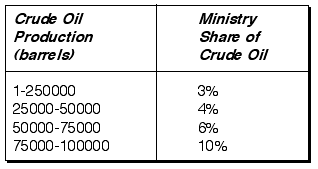
Partnership in Oil Production: Does it Guarantee Satisfactory Interests for Partners? [Archives:2001/26/Business & Economy]
June 25 2001
The Ministry of Oil signed a number of production-partnership agreements with entrepreneurs and investment companies. Do relations between the two sides guarantee satisfactory rights for each? How does the agreement on partnership in oil production safeguard the government ‘s interests, as well as facilities offered for entrepreneurs and partners’ shares? Can any partner freeze the agreement in total or in part? How are the taxes that each partner pays to the ministry calculated? “The agreement organizing partnership in oil production allows the ministry to impose royalties on foreign investment companies. In return, it has to grant more facilities for entrepreneurs, and plan expenditure during the exploration and production phases. In addition, entrepreneurs keep the right to suspend the agreement or part of it,” an official in the Ministry of Oil told the Yemen Times.
Government Loyalties
The third article of the agreement entitles the government to impose loyalties to be taken in the form of unreturnable crude oil out of the total production from production blocs. It entitles the Ministry to a 3% of the monthly net production when production ranges between 1-25,000 barrels a day, 4% when production is between 25000-50000 barrels a day and 5% when production is 50000-70000 barrels a day. If production exceeds 75000 barrels a day, the ministry gets 8% and 10% if it exceeds 100000 barrels a day as shown below.

Period of the Agreement
The agreement period is divided into two phases, namely, the exploration and development phases. The first phase is divided into two 30-month phases. Entrepreneurs can extend these phases by 6 months in each phase, if they have meet their commitments. Again if entrepreneurs need more time they can extend it to no more than 9 months to make an evaluation of exploration activities or to drill more wells. The development phase extends over 20 years beginning from the discovery of the first well. This period can be extended to 5 years more subject to consent of the Ministry of Oil.
Work and Expenditure Program during the Exploration Phases
During the first phase of exploration, entrepreneurs must undertake US$ 6 million expenditure as a minimum. During the second phase they commit themselves to covering costs of seismic surveys and drilling a single exploration well estimated at US$ 6 million as a minimum.
Retirement of Costs
The agreement entitles entrepreneurs to get back costs of expenditure after subcontracting 50% from the total cost of crude oil every 3 months. By this entrepreneurs can get back the operation expenditure at the same tax-year, 75% of the exploration expenditure as a minimum, 75% of the development expenditure as a minimum.
Production Sharing in the Current Year
How are partnership and sharing organized in terms of the crude oil that is not involved in the petroleum operations? The agreement provides as follows

Taxes and Grants
The agreement includes different kinds of unreturnable taxes that entrepreneurs should pay to the government. Entrepreneurs should also shoulder 3% of the actual expenditure on explorations as a fixed tax on foreign laborers during the exploration phase. Foreign labors are also exposed to all kinds of income taxes during the development and promotional phase. In the meantime entrepreneurs should pay all income and withholdings taxes.
As far as grants are concerned, US$ 500,000 is paid through a letter of credit in favor of the ministry. The following grants are to be paid as well: a US$ 100,000 grant for training, an annual grant of US$ 100,000 as an institutional support, US$ 100,000 for social development which should be paid within thirty days after expiry of the agreement term, US$ 1,000,000 as a production grant payable within 30 days following initiating commercial production, US$ 2,000,000 payable within 30 days when production exceeds 50,000 barrels a day and US$ 5,000,000 payable within 30 days when production exceeds 100,000 barrels a day.
Yemenization of Jobs
One of the responsibilities of the Ministry of Oil during the agreement period is to prepare and monitor implementation of a training program for local employees and for gradually Yemenizing jobs. Entrepreneurs must help employ Yemeni graduates of Geology and Geophysics, specially during the exploration phase.
To sum up, the agreement is likely to ensure partners’ interests in an organized and a legal way. Such a way will certainly help increase the state’s revenues and will help entrepreneurs make good profits.
——
[archive-e:26-v:2001-y:2001-d:2001-06-25-p:./2001/iss26/b&e.htm]


